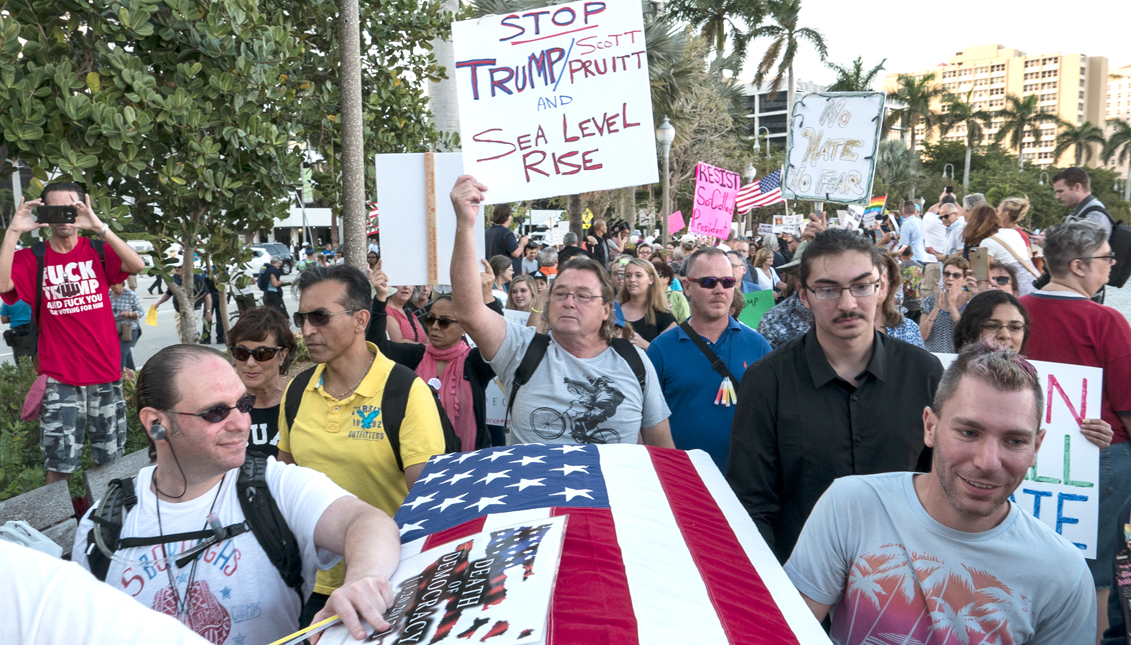
[OP-ED]: Which ‘American workers’ does Trump aim to protect?
Among the flurry of jaw-dropping executive actions we’re trying to keep up with was President Trump’s withdrawal from the Trans-Pacific Partnership.
MORE IN THIS SECTION
Among the flurry of jaw-dropping executive actions we’re trying to keep up with was President Trump’s withdrawal from the Trans-Pacific Partnership. The trade agreement between the U.S. and 11 other Pacific-rim countries was an attempt by the Obama administration to stem China’s growing influence in the region and around the world.
“This action ushers in a new era of U.S. trade policy in which the Trump administration will pursue bilateral free trade opportunities with allies around the world, wherever possible, to promote American industry, protect American workers, and raise American wages,” read the White House press release. “It is the policy of the Trump administration to represent the American people and their financial well-being in all negotiations, particularly the American worker, and to create fair and economically beneficial trade deals that serve their interests.”
But which workers, really, is Trump talking about?
For some answers, I called Jose Oliva, co-director of the Food Chain Workers Alliance, a Chicago-based national advocacy organization seeking to improve wages and conditions for workers in the food-services industry. The group had vocally opposed the TPP on the grounds that past U.S. trade policies have had the unintended consequence of spurring foreign workers to migrate to the United States, which increased competition for jobs.
I asked Oliva what to make of the White House’s claim of representing “the American people and their financial well-being in all negotiations.”
“Trump is opposed to free trade for xenophobic and anti-globalist reasons but the world is what it is and there is no going back, whether he rejects free trade aggressively or not,” he said. “But the reality is that trade regimes are going to continue to exist, and there is a real potential of TPP coming back even uglier.”
As for NAFTA, which Trump has called “the worst trade deal maybe ever signed anywhere,” Oliva remarked: “I don’t doubt for a minute that he is going to renegotiate NAFTA, but how? ... If it is renegotiated completely in private with little oversight, like TPP was, who is going to ensure that labor, environmental and other concerns are going to be addressed?”
While it hardly seems possible, it’s worth considering that a renegotiated NAFTA could end up being costlier to American consumers. We think about American job loss now, but we could be looking at a combination of higher prices for consumer goods coming from south of the border and a shortage of workers to do the dirty jobs of picking our crops and processing our meat, making food staples more expensive.
We must ask ourselves what Trump imagines when he refers to “American workers.” He loves promising them a better deal in life -- and that’s laudable. But whenever I hear him refer to “American workers,” I get the distinct feeling Trump has very specific workers, in very specific places, in mind.
“It’s a meta frame, it’s absolutely dog-whistle language meant to refer to white, male manufacturing workers in rural locations,” said Oliva. “The reality speaks otherwise.” The food industry is one of the nation’s largest employment sectors, with about 18 million workers. The USDA estimates that about 70 percent of hired crop farmworkers are Latino and half of them are undocumented. Workers in meat and poultry processing are largely Latino but, according to Oliva, about 30 percent are African-American. Restaurants and bars employ about 11 million workers, over 70 percent of whom are people of color and about 40 percent are undocumented, according to Oliva.
It’s hard not to come to the conclusion that there are dark days ahead for workers who don’t fit the template of high-wage-earning skilled labor. Especially when you stop to consider that Trump’s pick for labor secretary, Andrew Puzder, faced numerous Labor Department violations while he helmed Carl’s Jr. and Hardee’s, and he has been an outspoken critic of efforts to raise the minimum wage and provide mandatory sick leave.
In Oliva’s mind, Puzder’s nomination signals the new administration’s predilection for “jobs that pay minimum wage, have no long-term prospects and are essentially exploitative. Basically, Trump doesn’t see food jobs as real jobs. For him, the real jobs are heartland industrial -- even as the fastest-growing sector is service, not manufacturing.”
It’s not all doom and gloom, however. There is plenty to do in order to ensure that all workers get a fair shake: You can be more civically engaged in your community and help get out the vote in local elections.
And since we now have a businessman as president, the following strategy should be especially effective: Vote with your wallets for companies that treat their workers well.







LEAVE A COMMENT:
Join the discussion! Leave a comment.